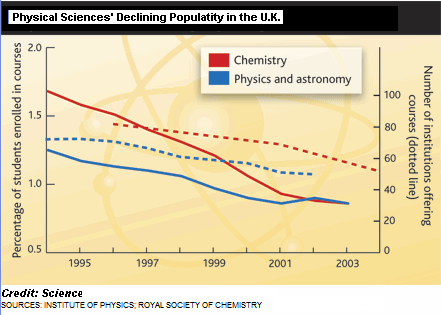 UK
Universities Remain Under Financial Pressure - Chemistry and Physics Continue in Decline. (February 6, 2005)
UK
Universities Remain Under Financial Pressure - Chemistry and Physics Continue in Decline. (February 6, 2005)
|
News & Views item - February 2005 |
![]()

It was only three weeks ago TFW ran with "UK Scientists Accuse British Universities of Dumping Enabling Sciences in Favour of the Cheap and Popular," and reported that the chairman of a House of Commons investigating committee to hold a wide-ranging inquiry into the state of science in English universities ...following a series of degree course closures in chemistry, physics, mathematics and engineering is to be Ian Gibson, the Labour member for Norwich North. Dr Gibson was awarded a PhD by Edinburgh University, then joined the University of East Anglia and served as Dean of the School of Biological Science from 1991 to 1997 before entering the House of Commons.
Dr Gibson has now launched a broadside which may bring a wan smile to Aussie academics. "[university administrators] will teach anything to get students." He then explained himself to Science citing the example that few high school students see the benefit of studying a basic science. On the other hand television has made jobs in forensics seem glamorous, and universities now offer courses that appear to provide a fast track to that career. But police chiefs have told Gibson's committee that they don't want such graduates. What they need are "good chemists and physicists." And Gibson saved a round for his colleagues. Science's Daniel Clery on interviewing Gibson reports, "The current crisis is the result of politicians forcing university administrators to think like business people and make decisions on purely financial grounds. 'There is a lack of understanding among academic bigwigs about the needs of chemistry and physics.'"
However, the problems in the UK reflects in part what's seen in Australia. Demand for physics and chemistry classes has been steadily falling and its courses such as sports science, forensic science, and media studies, that Britain's high school graduates are finding attractive. According to Science, "many blame science's declining appeal on the lack of good role models in the classroom. Britain's school system has long had a problem attracting science graduates into teaching; other careers offer much better salaries and opportunities for advancement. As a result, few high school pupils are taught physics or chemistry by teachers with degrees in those subjects."
In addition there is a consensus among staff that the government is not providing enough for expensive lab-based courses such as physics and chemistry. Government funding "has never been able to finance science departments to operate at even a minimum level," Philip Kocienski, head of Leeds University's School of Chemistry, told Science. While each humanities student earns a university £3,500, while each undergraduate in lab-intensive subjects such as physics and chemistry, for example, wins the university 1.7 times as much (~£5,800). Medics, dentists, and vets earn a fourfold boost (~£13,800).
Finally, in what looks like an extraordinary display of finger pointing, Clery writes:
Many researchers argue that this extra funding is not enough to cover the costs of lab buildings, materials, and support staff. "Chemistry is expensive to teach," says Simon Campbell, president of the Royal Society of Chemistry, and the Higher Education Funding Council for England (HEFCE) provides "woefully inadequate funding." John Enderby, president of the Institute of Physics agrees: "In all subjects the full cost of teaching is not met, but the shortfall is greatest for the laboratory sciences." HEFCE spokesperson Philip Walker counters that the allowances are based on a study of what universities actually spend. "We have to have a fair and transparent means to allocate the money," he says. In any event, Walker points out, once HEFCE has done its calculations, the money is given to the university as a lump sum. "Universities can allocate the money internally as they want." The implication is that Exeter itself bears the chief responsibility for the choices it made. "Exeter's chemistry department was not a dying animal," says Stephen Chapman, head of the School of Chemistry at Edinburgh University. "It was shot rather than left to die."
For the moment at least Labour's Gibson isn't buying Walker's excuses and although the the UK's Research Assessment Exercise (RAE) has been blamed, at least partially for sending all but the top performing university research departments to the wall there's more to the dilemmas of the enabling sciences than the RAE. What recommendations Gibson's committee will come up with, and how much notice the Blair government will take of them, remains to be seen.